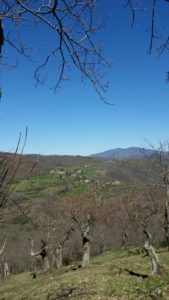I said that this post would be on feedback, but there’s something more immediate I’d like to talk about here – stroking our horses. Stroking has enormous significance to what Tom Dorrance describes as the ‘foundation’ of horsemanship – horses ‘coming to us for security’ (True Unity, p 12). Without this, he says, nothing will work. Above all else, we want our horses to feel happy and safe with us. This is what leadership is about.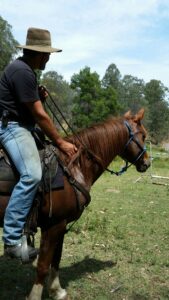
Category Archives: Care
Living in-relation with horses: being present
Any activity performed with skill requires good timing. This is true of catching a wave, for example, or hitting a ball or playing a musical instrument or dancing …. Good timing is also essential to skilful horsemanship, both on the ground and in the saddle. Whatever the specific skill might be, acquiring the capacity for good timing takes never-ending practice, and it depends on a particular temporal way of being – being present.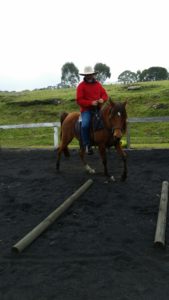
Continue reading Living in-relation with horses: being present
Living in-relation with horses: support 2
In this post, I’ll just give one example of the connected form of support that I outlined in the previous post. The situation that I’ll describe will be immediately recognisable to horse people. The ways of addressing it vary enormously.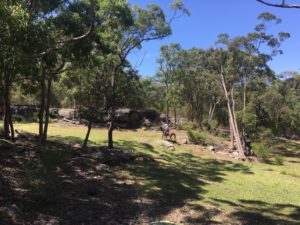
My horse Pia is very sensitive and can easily frighten. So, we pay particular attention to ensuring that she feels safe with us. When we offer support, it’s crucial that it be something that she will look for and appreciate, rather than something to brace against. The more I work with Corey, the more trusting and happy Pia becomes – it is a joy to see the transformation.
Living in-relation with horses: support
In this post, I want to introduce one of the most basic issues for living in-relation with horses, that of support. From the relational perspective of inter-being, giving support is our key responsibility in this relation.
Working with Corey Ryan, I am continually learning the significance of support in a horse-human relation, and how this is analogous to that called for in a student-teacher relation. When I am with Corey, I find that I am able to let go of any worries or fearful anticipations and remain present to what is at hand, open to possibilities and confident in trying things out. Quite simply, I feel supported in this learning experience. I am also very aware that, in Corey’s presence, horses remain or become calm and relaxed, and, in that state, curious about their environment and capable of learning new things. Clearly, then, we are sharing this experience of support and calmness. And, so, I make the rather obvious connection: Corey is giving me the sort of support that I need to give horses, and through his support I am developing the capacity to support them. Continue reading Living in-relation with horses: support
Living in-relation with horses: interbeing
This is the first of a series of posts I hope to do on living in-relation with horses.
I have been inspired to write about this by Corey Ryan, a horseman with whom I’ve been working over the past year. Corey’s understanding of relationship and connection makes such a difference to the learning experience for horse and human. Through him, I am learning anew the significance of a relational way of being, and more and more about being in-relation with horses. I will be giving examples of these learning experiences in subsequent posts.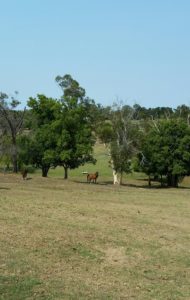
Here I want to take as a starting point the ecological principle of universal connectedness, and raise some questions about the implications of this for living in-relation with horses. The Buddhist monk Thich Nhat Hanh uses the term ‘interbeing’ to describe this ecological principle. He says ‘To be is to inter-be. You cannot just be by yourself alone. You have to inter-be with every other thing’. All things in the universe are interconnected. The vegetables that I am eating needed the sun and rain and earth to grow; the rain needed a cloud that was blown by a wind that connected far distant places and people… (The Heart of Understanding P4). Continue reading Living in-relation with horses: interbeing
Belonging in Anghiari – Daniele Cavallotti
For the past couple of years, I have been conducting interviews with people who live in Anghiari. Some are conducted in Italian, some in English, and they are all published in both languages on this blog. While in Anghiari in spring this year, I continued this project.
Appartenenza ad Anghiari – Daniele Cavallotti
Daniele è nato a Pavia, una città a 30 km a sud di Milano. Vive ad Anghiari dal 2011 quando si è trasferito per stare vicino a Elisa Sassolini con cui ora è sposato. Ho anche intervistato Elisa e i genitori, le loro interviste saranno pubblicate fra poco. Daniele ha una laurea in legge e ora ad Anghiari si occupa di varie proprietà, quasi tutte di stranieri, e degli ospiti che le affittano. Anch’io sono stata una di loro e ho visto con che impegno Daniele svolge il suo lavoro. L’intervista si è svolta in inglese, è stata poi trascritta e tradotta da Mirella Alessio e questa ne è la versione editata in italiano.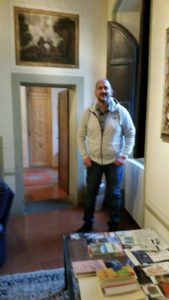
Sono nato nel 1969 quindi quest’anno compio 50 anni e questa è una cosa che mi fa riflettere. I miei genitori…penso a loro spesso. Mio padre era una persona di origini modeste, ha cominciato a lavorare in banca a 17 anni e, 40 anni dopo, era vice-direttore della filiale. Ha fatto una notevole carriera perché era una persona con un certo talento e …che amava la gente, mandavano lui quando aprivano una nuova sede. Mia madre era una casalinga, ma aveva lavorato con successo come segretaria in una ditta molto innovativa che produceva autoclavi. Quando sono nati i bambini aveva deciso di stare a casa e fare la mamma. Eravamo in tre, vicini d’età, io sono il più grande, poi mio fratello, un anno più giovane e mia sorella che ha quattro anni meno di me.
Belonging in Anghiari – Fabio Cecconi
For the past couple of years, I have been conducting interviews with people who live in Anghiari. Some are conducted in Italian, some in English, and they are all published in both languages on this blog. While in Anghiari in spring this year, I continued this project.
Appartenenza ad Anghiari – Fabio Cecconi
Fabio ha 38 anni ed è sempre vissuto ad Anghiari dove lavora nella segreteria della Libera Università dell’Autobiografia, la LUA, fondata nel 1998 da Saverio Tutino e Duccio Demetrio. Ho intervistato Fabio nel suo ufficio che si trova in piazza del Popolo nella parte medievale della città. L’intervista si è svolta in italiano ed è poi stata trascritta e tradotta in inglese da Mirella Alessio. Questa è una versione editata.
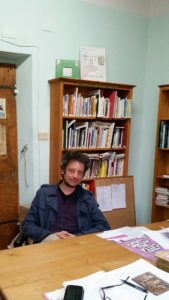 Io sono nato qua ad Anghiari, vivo qua da sempre, a parte i viaggi all’estero, però alla fine sono sempre tornato. Ho avuto un’infanzia felice, bellissimi amici, bellissimi ricordi, piena di attività vere, nascondino, rincorse, giocare a pallone, non avevamo il cellulare, FB, WhatsApp, eravamo felici, anzi forse più di adesso, perché senza questa tecnologica avevamo l’obbligo di vedersi, se volevi parlare con una persona dovevi vederla.
Io sono nato qua ad Anghiari, vivo qua da sempre, a parte i viaggi all’estero, però alla fine sono sempre tornato. Ho avuto un’infanzia felice, bellissimi amici, bellissimi ricordi, piena di attività vere, nascondino, rincorse, giocare a pallone, non avevamo il cellulare, FB, WhatsApp, eravamo felici, anzi forse più di adesso, perché senza questa tecnologica avevamo l’obbligo di vedersi, se volevi parlare con una persona dovevi vederla.
Holidays
We are in the midst of what here is referred to as a ‘ponte’ (bridge), a series of holidays. There has been Easter, and tomorrow, Liberation day, and then, next week, May day. And for a week, in Anghiari, starting today, there is the annual artisans’ show and market. People are on the move around Italy, and, here in Anghiari, there are quite a lot of Italian tourists. Café Garibaldi has been busy, and this is a photo of the proprietor today, cleaning the tables outside in preparation for another full day.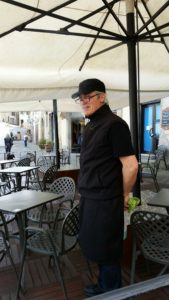
La creanza/manners
A letter to il venerdì, the Friday supplement in the daily La Repubblica, spoke of the loss of a respectful way of life that valued manners. In a state of distraction, people forget the ‘easy stuff’ (‘roba facile’), the simple gestures of ‘buongiorno’ ‘grazie’, and a smile with whomever you meet. The author used a number of different words for manners and courtesy, but the one I liked best, (for its etymological resonances?) was ‘la creanza’. In an office, in a shop, in the street, these small things make a difference. Without ‘good manners’, a community doesn’t live well, he said. 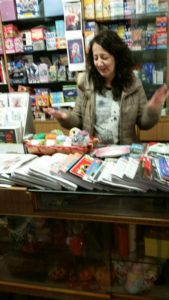
Tranquillo
Whilst here, in Anghiari, I have been reading a lovely book called A Philosophy of Walking (by Frédéric Gros). Here are a couple of passages on the experience of time when walking:
Walking is the best way to go more slowly than any other method that has ever been found. To walk, you need to start with two legs. The rest is optional. If you want to go faster, then don’t walk, do something else: drive, slide or fly. Don’t walk. And when you are walking, there is only one sort of performance that counts: the brilliance of the sky, the splendour of the landscape. Walking is not a sport. (2014: 2)
